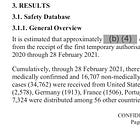Senator Ralph Babet: My Battle for the Truth About Australia’s Spiralling Death Rate
Since the day I was elected as a Senator for Victoria I have been seeking answers as to why so many of my fellow Australians are dying.
One-time or recurring donations can be made through Ko-Fi:
By Senator Ralph Babet July 3, 2024
Since the day I was elected as a Senator for Victoria I have been seeking answers as to why so many of my fellow Australians are dying.
It took five attempts to convince my colleagues in the Australian Senate that a spike in the number of deaths was worth investigating. Perhaps their reluctance was due to other priorities. Our political class fully intended to look at excess deaths amongst their fellow Australians just as soon as they’d erected a few more wind turbines and installed some more solar panels on prime agricultural land. Maybe their lack of curiosity was just bloody-minded politics. After all, dead people don’t vote.
I suspect the real reason behind the complete lack of curiosity was fear – that an inquiry into excess deaths might open a Pandora’s box of uncomfortable questions and that the findings might demand that those responsible are held to account. Many of these people are still in power today.
Since 2021, more people have been dying than expected in our nation. You’d have to go back to the horrors of the Second World War to find as many excess Australian deaths as we experienced in 2022. The phenomenon of excess mortality has continued into 2024.
While others were prepared to dismiss excess deaths as just one of those things that happens from time to time, while arguing about whether people on the NDIS [National Disability Insurance Scheme] should be able to charge the taxpayer for sex workers, I could not. And so, after two years of petitioning my incurious colleagues, I finally convinced enough of them – 31 to be exact – to hold an inquiry. For the record, 30 senators voted against the idea. Every Labor and Greens member present voted against it.
My relief at finally being able to hold an inquiry was tempered by the shock that Labor and Greens senators were not only uninterested but opposed to investigating a medical emergency taking place right under their noses. If there was a sudden increase in the number of koalas dying, you’d be killed in the stampede of Labor and Greens senators wanting credit for an inquiry. If we ever get to the bottom of excess deaths, we need an inquiry into why so many politicians elected to represent the Australian people appear determined to do anything but represent the Australian people.
Getting senators to agree to an inquiry was only half the battle. The Senate insisted that the public would be given less than four weeks to make submissions on what was literally a matter of life and death. I managed to negotiate an extension to this date and the submissions came flooding in. The committee allocated just one day for public hearings, before all the submissions had even been uploaded to its website.
I suggested dozens of expert witnesses and multiple days of hearings, but the committee – sticking to the truism that you should never ask a question to which you don’t already know the answer – decided that most witnesses should be from government, government-funded or government-affiliated organisations.
The committee allocated five full days for public hearings into menopause, but just one day to excess mortality. Just six hours of testimony for more deaths than we’ve seen since the Second World War!
Despite all this, the public hearing was powerful and raised many questions.
While many want to put excess deaths down to covid, the truth is that not all these deaths are due to covid: far from it. The inquiry heard that deaths from covid had made almost no difference to life expectancy in Australia.
Did we really shut down our nation for two years to ward off an illness that appears to have made only a negligible difference to life expectancy?
The inquiry heard that only 702 of 17,276 deaths (4.06 per cent) where covid was listed on the death certificate were from covid alone. In other words, almost 96 per cent of people who died from covid had pre-existing chronic conditions.
The Australian Bureau of Statistics confirmed that the median age of death for people recorded to have died ‘from’ or ‘with’ Covid is 87.3 years. Yet in 2020-2022 the life expectancy at birth for an Australian was 81.2 years for males and 85.3 years for females. Covid was clearly not the bogeyman so many have painted it to be.
But how do we explain excess deaths? And why have excess deaths continued long after the pandemic and with most of the population vaccinated?
Did I just mention vaccination? It remains the thrice-jabbed elephant in the room. The inquiry heard powerful testimony from people who had suffered terribly from vaccine injuries though grateful to live to tell the story to senators who shifted uncomfortably in their seats.
No evidence was more explosive than that of Dr Jeyanthi Kunadhasan from the Australian Medical Professionals’ Society (AMPS). She told senators that a peer-reviewed paper had suggested there were allegedly undisclosed deaths during the Pfizer covid vaccine trial, deaths that raised questions about the safety of the vaccine and its continuing effect on the health of many Australians who felt that they were coerced into taking it.
Could the vaccine explain the sudden increase in excess mortality? I don’t know, but we need to find out. And might this very question explain the reluctance of senators who had to be dragged, kicking and screaming, into holding an inquiry where it could even be asked?
As a result of the inquiry, the Australian Bureau of Statistics and the Australian Institute of Health and Welfare have opened a door for further inquiry. They have committed to allowing academics and research organisations to apply for access to data from the Australian Immunisation Register as well as data on deaths so that there can finally be an investigation into what role, if any, vaccination might have played in the excess deaths we are now seeing.
While the Senate committee will release its report in August, the opportunity for academics to do more research (if granted access) will likely be the greatest triumph of the inquiry.
I would not presume to pre-empt what the research might uncover, but the fact we had to fight so hard to win even a single day of public hearings in the first place is telling.
Although this short inquiry is coming to an end, the issue of excess deaths is persistent and those of us who are brave enough to go wherever the evidence leads, will keep fighting for truth and justice for all those who have died.
May God bless you and our nation.
This article appeared in the Spectator Australia on June 27, 2024, and is republished by kind permission.
Source: conservativewoman.co.uk
Related articles:













It's the depopulation agenda at warp speed
"Since the day I was elected as a Senator for Victoria I have been seeking answers as to why so many of my fellow Australians are dying." While I appreciate his tenacity,--and wish elected officials everywhere had the same verve--he can't be too bright if he still doesn't know (or pretends not to).